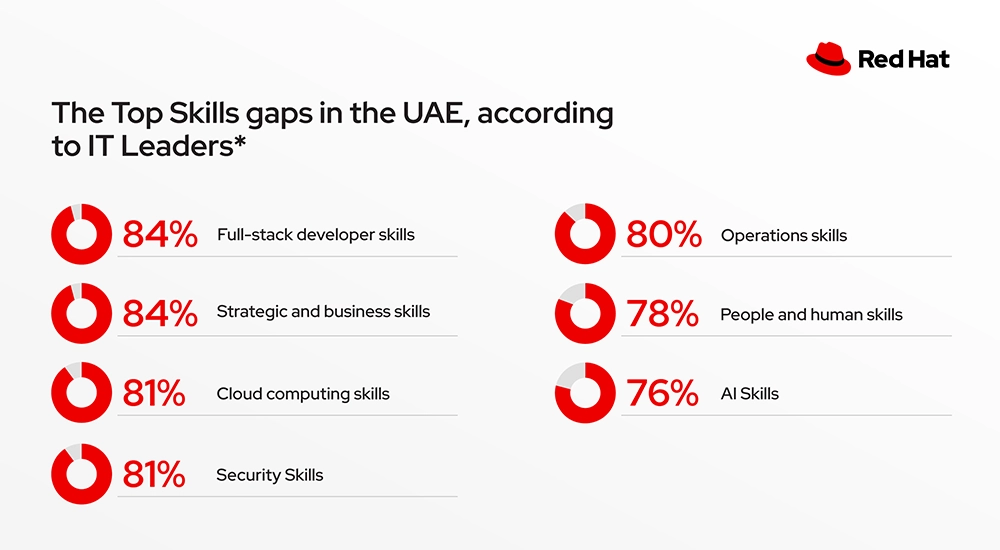Red Hat has announced new survey results highlighting the prominence of AI for UAE organisations’ IT strategies1 . The findings reveal UAE organisations anticipate boosting AI investment by an average of 31% by 20262
When asked about their organisation’s IT strategy for the next 18 months, AI is one of the top-ranked priorities among 82%3 of respondents, along with security (833%), followed by cost optimisation (81%3), and sovereignty (76%3).
However, 96%4 of organisations surveyed report they are not yet driving customer value from their AI investments.
To overcome these challenges and help turn ambitions to reality, UAE organisations are embracing open source across all areas of IT strategy. The survey shows that 100%11 of UAE IT leaders view open source as vital for cost optimisation11, post-quantum cryptography11, and virtualisation11.
AI a work in progress
One of the highest AI priority of respondents for the next 18 months (83%3) is agentic AI, AI systems that operate with high degrees of autonomy and can execute complex, multi-step tasks with limited human intervention. Enabling broad employee adoption and operationalising AI are also ranked high on the priority to-do list, with 86%3 and 85%3 agreeing respectively.
Retaining and developing the right talent remains a challenge, with AI skills still ranking among the most urgent gaps, as cited by 76%3 of respondents. Within AI specifically, the talent shortage mirrors the target priorities for UAE IT and AI leaders: connecting AI to enterprise data cited by 59%[1] of respondents, effective use of agentic AI cited by 57%, efficient use of AI capabilities cited by 58%, and educating the business to use AI reported by 47%. Almost all (98%12) of respondents experience barriers to AI adoption, especially integration challenges with existing systems (36%), data privacy and security concerns (32%), and lack of buy-in from stakeholders (32%).
Additionally, 70%6 of respondents report they are experiencing a “shadow AI” problem – i.e., unauthorised use of AI tools by employees.
Confidence tempered by complexity; open source key
Confidence in the UAE’s potential on the global AI stage is high, with 99%7 of responding UAE businesses believing the nation is, or will soon become, an AI powerhouse within the next three years8. A similar sense of optimism exists in other countries: 99%9 of respondents in Spain shared the same view, followed closely by Sweden, Germany, and the Netherlands at 98% each, while 83% of businesses in the UK expressed similar trust in their nation’s AI trajectory.
In terms of limiting factors to the UAE’s rise in AI prominence, 62% of respondents cite a lack of computing infrastructure, followed by lack of talent pipeline (52%), and lack of public funding (45%), as the key hold-ups10.
National data protection and sovereignty goals remain priorities on the IT agenda in the country, with AI adding complexity as another workload that must align to evolving cloud strategies. Barriers to cloud adoption remain as well, with respondents pointing to limited support from leadership (77%3 agree), unclear ROI (72% agree3), employee resistance to change (69% agree3), and lack of skills (69% agree3). Drilling down into cloud sovereignty strategy over the next 18 months, UAE respondents are prioritising operational control and autonomy (86%3), securing the software supply chain (81%3), and flexibility and choice of IT suppliers (86%3).




















